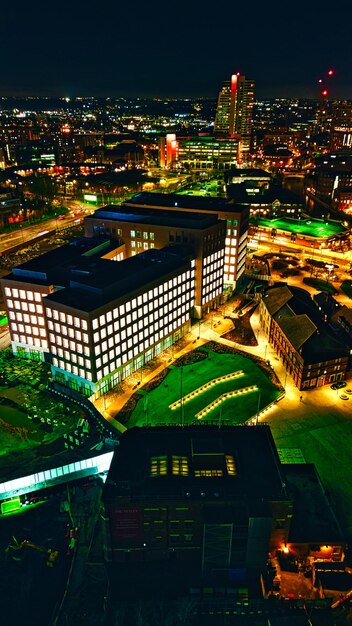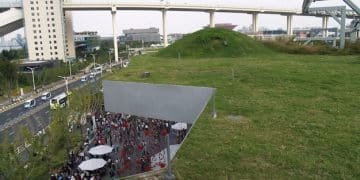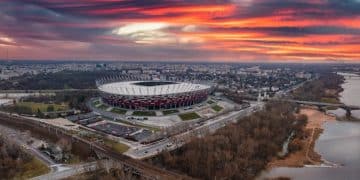FIFA 26 World Cup Host City Selection: How the US Benefits

The FIFA 26 World Cup host city selection process significantly benefits the US by positioning its chosen metropolitan areas at the forefront of global sports tourism and economic development, fostering unprecedented infrastructure enhancements and securing long-term international recognition.
The spotlight is increasingly turning towards the FIFA 26 World Cup Host City Selection: How the US Benefits from the Latest FIFA Decision. As the world’s most prestigious football tournament approaches, understanding the profound implications of FIFA’s choices on American soil becomes paramount. This article delves into the layers of advantages the United States stands to gain from hosting portions of this monumental event, exploring economic, cultural, and infrastructural impacts.
the strategic importance of hosting the FIFA world cup on us cities
Choosing host cities for the FIFA World Cup is never a random process; it involves meticulous planning and strategic considerations. For the United States, securing a significant number of host cities for the 2026 tournament highlights its global standing in sports and its capacity to manage events of this magnitude. FIFA’s decisions are not merely about selecting stadiums; they are about leveraging existing infrastructure, stimulating local economies, and creating lasting legacies for urban development.
The selection prioritizes cities with robust transportation networks, adequate accommodation, and strong public support. It also considers the geographic distribution to ensure equitable representation and ease of access for fans traveling across the vast expanse of the US. This strategic approach aims to maximize operational efficiency while delivering an unparalleled experience for players, officials, and millions of spectators.
economic boom and job creation
One of the most immediate and tangible benefits for US host cities is the projected economic boom. Hosting a World Cup brings a massive influx of international tourists, media, and participating teams, leading to significant spending in various sectors. This includes hospitality, retail, transportation, and entertainment.
- Increased tourism revenue: Millions of visitors will spend on hotels, restaurants, and local attractions.
- Job creation: Temporary and permanent jobs will emerge in construction, event management, security, and service industries.
- Local business support: Small and medium-sized enterprises (SMEs) will experience heightened demand for their goods and services.
Beyond the direct financial gains, the World Cup acts as a catalyst for future economic growth. The enhanced global visibility and improved infrastructure can attract foreign investment and encourage domestic businesses to expand, creating a ripple effect that extends far beyond the tournament’s duration.
infrastructural development and urban renewal
Preparing for an event as grand as the World Cup often necessitates significant infrastructural upgrades. Host cities frequently invest in improving public transportation, renovating stadiums, and enhancing public spaces. While these projects require substantial upfront capital, they yield long-term benefits for city residents and future economic activities.
Many stadiums earmarked for the World Cup are already state-of-the-art facilities, but even these may undergo enhancements to meet FIFA’s stringent requirements for media, fan zones, and operational logistics. Beyond stadiums, airports see expansion, roads are improved, and public transit systems are optimized, all contributing to the overall functionality and appeal of the urban environment. This serves as a powerful testament to the transformative power of hosting mega-events.
The strategic selection of US host cities reflects a deep understanding of their potential to deliver a world-class event while simultaneously reaping substantial economic and developmental rewards. The meticulous planning ensures that the chosen locations are not just venues, but active participants in shaping the tournament’s success and their own future trajectories.
global recognition and increased tourism
The FIFA World Cup provides an unparalleled platform for global exposure. For the US host cities, this means an opportunity to showcase their unique cultures, attractions, and hospitality to billions of viewers worldwide. This exposure can translate into sustained increases in tourism and investment for years to come, long after the final whistle of the 2026 tournament.
Each host city will have its moment in the global spotlight, attracting not only football fans but also business delegates, media professionals, and cultural enthusiasts. This diverse influx of visitors contributes to a more dynamic and internationally recognized urban landscape. The marketing reach of the World Cup is immense, offering cities a promotional boost that would be otherwise unattainable through traditional campaigns.

showcasing american culture and diversity
The United States is a melting pot of cultures, and the World Cup offers a unique chance to celebrate this diversity on a global stage. Each host city, with its distinct identity, will contribute to a multifaceted presentation of American culture. From the vibrant arts scene of New York to the innovative spirit of Silicon Valley, and the sun-soaked beaches of Los Angeles, the tournament will highlight the breadth and depth of the nation’s cultural tapestry.
This cultural exchange is a two-way street; while the US showcases its heritage, it also embraces the diverse traditions of visiting nations. Fan zones, cultural festivals, and community events will foster a spirit of international camaraderie, building bridges between different peoples and fostering mutual understanding. This soft power diplomacy can significantly enhance the US’s image on the world stage, presenting it as an open, welcoming, and culturally rich nation.
long-term tourism dividends
The exposure gained during the World Cup often leads to long-term tourism dividends. People who experience the host cities, either in person or through media coverage, are more likely to consider them for future visits. The positive associations generated by the tournament can leave a lasting impression, encouraging repeat tourism and word-of-mouth recommendations.
- Post-event interest: Viewers and attendees may return for leisure or business travel.
- Brand recognition: Cities become more familiar and appealing on the global map.
- Investment appeal: Enhanced reputation attracts international businesses and residents.
Furthermore, the improved infrastructure and amenities developed for the World Cup become permanent assets, benefiting residents and making the cities more attractive destinations in the long run. The sustained interest transforms temporary success into enduring prosperity.
Ultimately, the global recognition and increased tourism are not just about numbers; they are about shaping perceptions and building enduring relationships. The FIFA World Cup in the US is poised to be a powerful vehicle for cultural exchange and economic revitalisation, ensuring that its host cities leave an indelible mark on the global consciousness.
boosting sports infrastructure and youth development
Beyond the immediate spectacle, the FIFA World Cup often leaves a profound legacy in terms of sports infrastructure and youth development. For the US, hosting the tournament provides an impetus to further invest in and enhance its football facilities, from professional stadiums to grassroots training grounds. This investment extends beyond the 2026 event, benefiting future generations of athletes and sports enthusiasts.
The focus on high-quality pitches, training facilities, and fan accommodations ensures that the tournament venues meet international standards. These upgrades serve not only the World Cup but also domestic leagues and local sports programs, elevating the overall quality of football infrastructure across the host cities and beyond.
legacy for grassroots football
One of the most significant long-term impacts is the boost to grassroots football. When a nation hosts such a major tournament, it often inspires a new generation of players and fans. The increased visibility and prestige of the sport can lead to higher participation rates in youth leagues, school programs, and amateur clubs. FIFA and host nations often collaborate on development programs aimed at strengthening football at the community level.
This involves not just financial investment but also sharing expertise in coaching, refereeing, and sports administration. The presence of world-class teams and players can motivate young aspirants to pursue their football dreams with renewed vigor. The World Cup thus serves as a powerful educational tool and a source of inspiration for countless children and teenagers.
technological advancements in stadiums
Modern sports venues are increasingly incorporating cutting-edge technology to enhance the fan experience and operational efficiency. The World Cup acts as a significant driver for these advancements. Host stadiums in the US are likely to implement:
- Advanced connectivity: High-speed Wi-Fi and mobile networks for fans.
- Enhanced security systems: State-of-the-art surveillance and access control.
- Immersive fan experiences: Jumbo screens, interactive displays, and augmented reality features.
These technological upgrades often extend beyond the stadiums, benefiting the wider urban environment. Improved broadband infrastructure, smart city initiatives, and innovative transportation solutions can all be accelerated by the demands of hosting a major international event. The technological legacy ensures that the host cities remain at the forefront of urban innovation.
The commitment to improving sports infrastructure and fostering youth development underscores the long-term vision behind hosting the World Cup. It’s not just about a month of exhilarating football; it’s about building a sustainable future for the sport and its communities, leaving a lasting positive imprint on the US sports landscape.
soft power and diplomatic advantages for the us
Beyond economic and infrastructural gains, hosting the FIFA World Cup offers significant soft power and diplomatic advantages for the United States. In an increasingly interconnected world, the ability to project a positive global image and foster international goodwill is invaluable. The World Cup, as a unifying force, provides a unique platform for the US to demonstrate its leadership, openness, and cultural appeal on a global scale.
The tournament brings together diverse nations and cultures, encouraging dialogue and mutual understanding. As hosts, the US has the opportunity to facilitate these interactions, showcasing its capacity for diplomacy and its commitment to international cooperation. The positive experiences of visiting fans, teams, and dignitaries contribute to a more favorable perception of the country, potentially influencing international relations and trade.
strengthening international relations
Major international events like the World Cup serve as natural forums for high-level diplomatic engagement. Leaders, envoys, and officials from around the world gather, creating opportunities for informal meetings, bilateral discussions, and multilateral cooperation. These interactions, occurring in a more relaxed and celebratory atmosphere, can help to strengthen existing alliances and forge new ones.
The shared experience of supporting a common global passion can help smooth over diplomatic tensions and build goodwill. The image of a welcoming and efficient host nation can significantly bolster the US’s standing on the international stage, demonstrating its capability to manage complex global undertakings successfully and harmoniously.
cultural exchange and global unity
Football, or soccer as it’s known in the US, transcends borders and languages, acting as a universal language. The World Cup exemplifies global unity, bringing together people from all walks of life to celebrate a shared love for the game. For the US, hosting this event means becoming a temporary melting pot of global cultures, an experience that can break down stereotypes and foster greater cross-cultural understanding.
Fan zones, cultural performances, and community events in host cities will allow locals and visitors to engage with diverse traditions, expanding their horizons. This cultural exchange contributes to reducing misconceptions and promoting a more nuanced understanding of different societies. The World Cup, in this sense, is not just a sporting event; it is a powerful vehicle for promoting peace and cohesion through shared passion.
The soft power and diplomatic advantages gleaned from hosting the FIFA World Cup are subtle yet profoundly impactful. They contribute to shaping the US’s international image, fostering stronger global partnerships, and promoting a spirit of unity through the beautiful game. This intangible legacy can yield dividends for many years after the final whistle blows.
long-term economic legacies and urban transformation
The economic benefits flowing from the FIFA World Cup are by no means limited to the duration of the tournament. The investments made in infrastructure, the elevated international profile, and the stimulated economic activity often create long-term legacies that fundamentally transform host cities. For the US, this means a sustained period of growth, enhanced urban appeal, and continued opportunities for development.
The improved transportation systems, modernised stadiums, and advanced technological infrastructure, initially developed to accommodate the World Cup, become permanent assets. These assets continue to benefit residents, attract new businesses, and support future events, contributing to the enduring vitality of the host cities. The World Cup serves as a powerful catalyst for urban regeneration and economic diversification.
attracting future events and conventions
Hosting such a globally significant event undeniably boosts a city’s reputation as a premier destination for large-scale gatherings. The experience and expertise gained in managing the complexities of the World Cup make host cities more attractive venues for future international conferences, sporting championships, and major conventions. This creates a sustainable pipeline of high-value tourism and business tourism.
- Enhanced reputation: Cities gain credibility as capable event hosts.
- Optimized infrastructure: Venues and facilities are ready for future large-scale use.
- Experienced workforce: A pool of trained professionals in event management and hospitality becomes available.
This continuous cycle of attracting major events contributes significantly to the local economy, providing ongoing employment opportunities, stimulating local businesses, and maintaining the vibrancy of the hospitality sector. It’s an investment that pays dividends through a prolonged period of elevated economic activity.
urban development beyond stadiums
While stadium improvements are often the most visible aspect of World Cup preparations, the ripple effect extends to broader urban development. Cities frequently undertake projects that revamp public spaces, improve civic amenities, and enhance aesthetic appeal. This includes revitalizing downtown areas, developing waterfronts, and creating new green spaces. These initiatives improve the quality of life for residents and make cities more attractive to businesses and talent.
For example, new housing developments, improved public transport links, and enhanced retail options often accompany major infrastructure projects. These developments address existing urban challenges and lay the groundwork for sustainable growth. The World Cup acts as a powerful incentive to accelerate urban planning initiatives that might otherwise take years to materialize.
In essence, the long-term economic legacies and urban transformation stemming from the FIFA World Cup are about much more than just football. They represent a strategic investment in the future of US cities, enhancing their capabilities, elevating their global standing, and ensuring a prosperous and vibrant future for their communities.
fostering national unity and pride
Beyond the tangible benefits, hosting the FIFA World Cup injects an unparalleled sense of national unity and pride into the host country. For the United States, a nation of diverse backgrounds and regional identities, the World Cup can act as a powerful unifying force, bringing people together under a common banner of support for their nation and the shared love of the sport. This collective experience creates lasting memories and strengthens communal bonds.
The excitement leading up to and during the tournament generates widespread enthusiasm, bridging cultural, social, and even political divides. People gather in fan zones, local pubs, and private homes to cheer on their teams, creating a festive and inclusive atmosphere. This shared emotional investment fosters a sense of belonging and collective identity that transcends individual differences.

the unifying power of sports
Sports, particularly a global phenomenon like football, possess an incredible ability to unite people. The World Cup elevates this power to its highest degree. For a month, national attention converges on the tournament, creating shared narratives, collective anticipation, and universal emotional responses. Wins are celebrated together, and losses are commiserated, forging a collective emotional experience that reinforces national solidarity.
This shared passion often translates into displays of national pride, from dressing in team colors to decorating homes and businesses with national symbols. Such visible expressions of unity can reinforce a sense of collective identity and purpose, reminding citizens of their shared heritage and aspirations. It’s a rare occasion where broad segments of society focus on a singular, positive, national endeavor.
inspiring future generations
The exposure to world-class football can inspire a new generation of American athletes, fans, and sports enthusiasts. Children seeing their heroes perform on home soil can be motivated to pursue sports, adopt healthier lifestyles, and develop a competitive spirit. This inspiration extends beyond football, potentially sparking interest in other sports and physical activities.
- Youth engagement: Increased participation in sports programs and clubs.
- Role models: Young people inspired by world-class athletes.
- Community building: Sports become a focal point for family and community activities.
The legacy of inspiration is critical for long-term health and wellness within communities. It fosters a culture of activity and participation, encouraging individuals to engage with sports not just as spectators but as active participants. The energy and excitement of the World Cup leave a lasting imprint on the national psyche, fostering a deeper connection to sports and a stronger sense of national well-being.
In conclusion, the FIFA World Cup’s impact on national unity and pride is multifaceted, extending far beyond the games themselves. It’s about creating a shared national experience, fostering a collective identity, and inspiring future generations through the universal language of sport. The benefits in this realm are invaluable, contributing to a more cohesive and proud American society.
challenges and considerations for us host cities
While the benefits of hosting the FIFA World Cup are substantial, it’s crucial to acknowledge the challenges and considerations that US host cities face. The immense scale of the event demands meticulous planning, significant financial investment, and robust coordination to ensure its success. Addressing these challenges effectively is paramount to maximizing the positive impacts and mitigating potential drawbacks.
Logistical complexities, security concerns, and the sheer volume of visitors present considerable hurdles. Host cities must navigate issues ranging from transportation congestion and crowd control to resource allocation and ensuring equitable benefit distribution across all communities. Proactive strategies are essential to transform these challenges into opportunities for growth and improvement.
logistical and operational complexities
Hosting a global tournament like the World Cup involves intricate logistical and operational planning. Coordinating the movement of millions of fans, teams, and officials across multiple cities requires a sophisticated approach to transportation, accommodation, and crowd management. Ensuring seamless operations across diverse urban environments is a monumental task.
- Transportation: Managing traffic, public transit, and airport operations for peak demand.
- Accommodation: Guaranteeing sufficient and varied lodging options for visitors.
- Event staffing: Recruiting and training thousands of volunteers and temporary workers.
Each host city will need to develop comprehensive operational plans, working closely with federal, state, and local agencies to ensure safety, efficiency, and a positive experience for all participants. The success hinges on intricate coordination and resilience in the face of unexpected challenges.
security and public safety
Security is a paramount concern for any major international event, and the World Cup is no exception. Ensuring the safety of millions of attendees, athletes, and dignitaries requires extensive planning and collaboration among law enforcement agencies. This includes counter-terrorism measures, crowd control, and emergency response protocols.
Host cities will invest heavily in bolstering security infrastructure, deploying advanced surveillance technologies, and training personnel to handle various scenarios. The goal is to create a secure environment that allows fans to enjoy the tournament with peace of mind. Balancing robust security with maintaining a welcoming atmosphere is a delicate but crucial aspect of preparation.
managing economic impact and cost overruns
While the economic benefits are significant, there’s always a risk of cost overruns and ensuring that the financial returns justify the initial investments. Host cities must carefully manage budgets, prioritize spending, and secure appropriate funding mechanisms. Transparency in financial reporting is essential to demonstrate accountability and ensure public trust.
Moreover, it is vital to ensure that the economic benefits are distributed equitably across all communities within the host cities, avoiding situations where only specific areas or businesses benefit. Strategies for supporting local businesses, engaging diverse suppliers, and creating accessible fan experiences are crucial for broad-based economic inclusion.
Addressing these challenges proactively and with a long-term vision positions US host cities to overcome potential obstacles and deliver an exceptionally successful and impactful FIFA World Cup. The ability to manage these complexities will ultimately define the tournament’s lasting legacy of efficiency and positive community impact.
| Key Point | Brief Description |
|---|---|
| 📊 Economic Boost | Significant tourism revenue and job creation in various sectors for host cities. |
| 🏗️ Infrastructure Development | Investments in public transport, stadiums, and urban spaces, benefiting residents long-term. |
| 🌍 Global Recognition | Showcasing US culture and attracting sustained international tourism and investment. |
| 🤝 Soft Power & Unity | Enhancing international relations and fostering national pride through shared experience. |
frequently asked questions about the fifa 26 world cup and us host cities
▼
FIFA primarily considers infrastructure readiness, including stadium quality, transportation networks, and accommodation capacity. They also assess financial viability, security capabilities, and governmental support. The goal is to ensure a smooth, safe, and memorable experience for all participants and fans while maximizing the tournament’s global impact.
▼
Local economies in US host cities are expected to experience a significant boost. This includes increased tourism revenue from visitor spending on hotels, dining, and shopping, along with substantial job creation in hospitality, event management, and security. The long-term economic benefits may also include increased foreign investment and sustained tourism after the event.
▼
Long-term infrastructural benefits include upgrades to public transportation systems, enhanced airport facilities, improved road networks, and renovations of stadiums and public spaces. These developments aim to meet FIFA’s stringent standards but ultimately serve to modernize urban environments, improve quality of life for residents, and support future economic growth and event hosting.
▼
Hosting the World Cup provides an unparalleled platform for US cities to showcase their culture, hospitality, and capacity for large-scale event management to a global audience. This enhances the country’s image, strengthens international relations through diplomatic engagement, and fosters cultural exchange, contributing significantly to its soft power and global standing.
▼
Host cities should anticipate significant logistical challenges, including managing immense crowds, ensuring efficient transportation for millions of visitors, and addressing complex security concerns. Financial management, including avoiding cost overruns, and ensuring equitable distribution of economic benefits across all communities are also crucial considerations for successful preparation.
conclusion
The FIFA 26 World Cup Host City Selection represents a profound moment for the United States, offering a constellation of benefits that extend far beyond the immediate thrill of the tournament. From stimulating substantial economic growth and driving pivotal infrastructural development to elevating global recognition and fostering national unity, the strategic decisions made by FIFA are poised to leave an indelible mark. While inherent challenges demand meticulous planning and significant investment, the overarching advantages—bolstering soft power, inspiring future generations, and transforming urban landscapes—underscore the immense value this event brings to the US. Ultimately, hosting a portion of this global spectacle is not merely about showcasing football expertise; it’s about investing in a future where American cities shine brighter on the world stage, reaping long-term dividends in every conceivable sphere.





